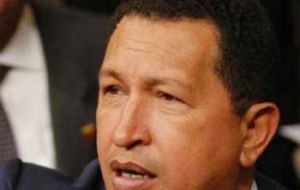MercoPress. South Atlantic News Agency
Venezuelan Funding to Latin America
 Chavez's government has pledged more than $8.8 billion in aid, financing and energy
Chavez's government has pledged more than $8.8 billion in aid, financing and energy Laid-off Brazilian factory workers have their jobs back. Nicaraguan farmers are getting low-interest loans. Bolivian mayors can afford new health clinics.
They can all thank Venezuelan President Hugo Chavez. Bolstered by windfall oil profits, Chavez's government is now offering more direct state funding to Latin America and the Caribbean than the United States. A tally by The Associated Press shows that Venezuela has pledged more than $8.8 billion in aid, financing and energy funding so far this year. The most recent figures available from Washington show that $3 billion in U.S. grants and loans reached the region in 2005. While Chavez's spending abroad doesn't come close to the overall volume of U.S. private investment and trade in Latin America, in terms of direct government funding, the scale of Venezuela's commitments is unprecedented for a Latin American country. Chavez denies he is in a competition with the U.S. "We don't want to compete with anyone. I wish the United States were 100 times above us," Chavez said. "But no, the U.S. government views the region in a marginal way. What they offer is a pittance sometimes, and with unacceptable pressures that at times countries can't accept." Clay Lowery, the U.S. Treasury Department's acting undersecretary for international affairs, said that the U.S. plays a larger role than reflected in its aid figures. Still, as the Chavez effect gains ground, there are signs the U.S. is responding to the challenge. The U.S. Navy medical ship Comfort is on a four-month, 12-country voyage to Latin American ports. U.S. officials are taking their cue from the free eye surgeries and medical training that Chavez offers, says Adam Isacson of the Center for International Policy in Washington. Opponents say that Chavez is spending haphazardly on "giveaways" abroad at a time when more than a quarter of Venezuelans still live on less than $3 a day. They question how long he can sustain it, since government revenues are highly dependent on fluctuating oil prices. While Venezuelan asphalt paves streets in Bolivia's capital, a sign recently protruded from one of Caracas' potholes reading: "Why for Bolivia yes and for me no?"




Top Comments
Disclaimer & comment rulesCommenting for this story is now closed.
If you have a Facebook account, become a fan and comment on our Facebook Page!